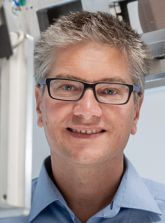
Franz Pfeiffer
Year of Election
Division
Nationality
Country/Region of working/living
City
Institute
CV
Professor Pfeiffer (b. 1972) conducts research on biomedical X-ray physics. His focus is on new imaging methods for improved early diagnosis and detailed studies of illnesses such as cancer, lung diseases and osteoporosis. His scientific work extends from fundamentally oriented research with brilliant X-rays in large international research centers to applied research on new concepts in radiology. Professor Pfeiffers most important contribution to science is the invention of a novel method for X-ray phase-contrast imaging and its translation to pre-clinical and clinical applications, with a particularly high diagnostic benefit for lung diseases.
Professor Pfeiffer studied physics at Munich’s Ludwig Maximilian University (1999) and was awarded doctorates by the Institut Laue-Langevin (France) and the University of Saarbrücken (2003). Following subsequent positions as a post-doc in Urbana-Champaign (USA) and as a member of scientific staff at the Paul Scherrer Institute (Switzerland, 2008), he assumed the position of assistant professor at École Polytechnique Fédérale in Lausanne (2008). He was appointed to the Chair of Biomedical Physics at TUM in 2009. In 2016, Professor Pfeiffer became the director of the Munich School of BioEngineering.
🏅 Blaise Pascal Medal in Physics (2025)
Awarded in recognition of his outstanding contributions to science, technology, and research education. His innovations in X-ray phase contrast and dark-field imaging have transformed medical diagnostics, and his work continues to shape biomedical imaging across scientific and clinical domains.
Awarded in recognition of his outstanding contributions to science, technology, and research education. His innovations in X-ray phase contrast and dark-field imaging have transformed medical diagnostics, and his work continues to shape biomedical imaging across scientific and clinical domains.
